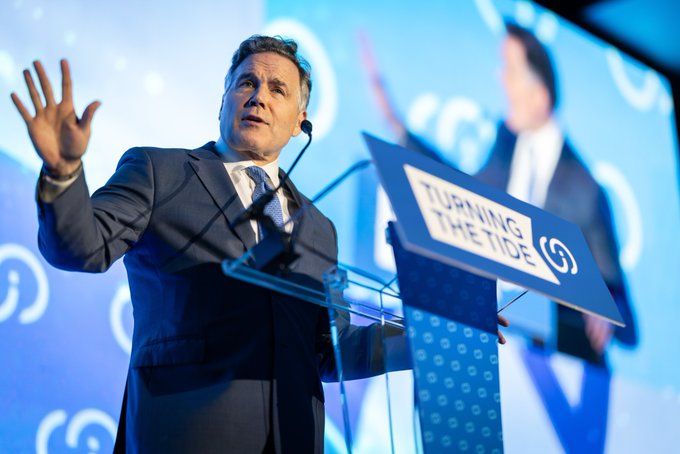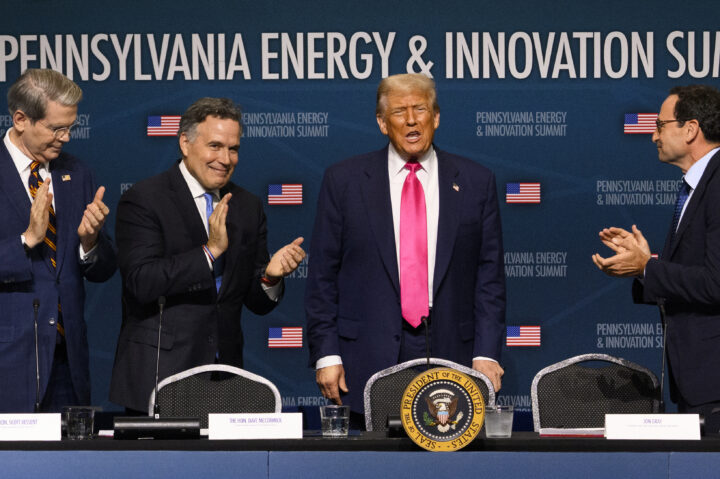McCormick: ’We have to eradicate [and] destroy the evil’ that caused the Oct. 7 attacks

Israel on Campus Coalition/X
Rep. Dave McCormick (R-PA) speaks at the ICC National Leadership Summit in Washington on July 29, 2025.
Israel’s response to the Oct. 7, 2023 Hamas terror attacks “changed the landscape in ways that could be for the good” and lead to the “possibility of a secure region,” Sen. Dave McCormick (R-PA) told a group of pro-Israel college students on Tuesday.
McCormick lauded Israel’s “historic” military efforts that led to the degradation of Iran’s terrorist proxies across the Middle East.
“What’s happened with the conduct of military operations since then in the fight against Hezbollah, the fight against Hamas, taking out much of Iran’s [nuclear] capabilities, what has happened with Israel’s incredible military leadership … has reset the possibility of a secure region,” McCormick told about 700 attendees on the final day of Israel on Campus Coalition’s three-day national leadership summit in Washington.
“It has changed the possibilities in the Middle East and I hope it’s brought an awareness and change to our complacency here at home in the need to fight against that pure evil [and] reset the table in the Middle East.”
“We have to eradicate [and] destroy the evil” that caused the Oct. 7 attacks, McCormick continued, referring to Hamas.
McCormick also took aim at the rise of antisemitism across the country, including in his home state.
After Oct. 7 “there was a second surprise attack. That’s the evil of antisemitism that we saw across our campuses,” McCormick said. “Most of us didn’t know the degree to which antisemitism would rear its ugly head on campuses across Pennsylvania and across our country.”
“It has shown us that we have to engage in a constant battle against the kind of hatred and evil that we saw in Israel on Oct. 7, but also that we saw across our campuses.”
The gathering also included the state’s two leading Democrats, Gov. Josh Shapiro and Sen. John Fetterman, and President Donald Trump

Jeff Swensen/Getty Images
President Donald Trump (C) arrives to speak to guests and investors at the inaugural Pennsylvania Energy and Innovation Summit at Carnegie Mellon University on July 15, 2025 in Pittsburgh, Pennsylvania.
PITTSBURGH — Pennsylvania’s top lawmakers put up a united front on Tuesday to emphasize to the hundreds of tech and energy investors at Sen. Dave McCormick’s (R-PA) inaugural innovation summit the benefits of working with states that embrace bipartisanship and the national security imperatives of investing domestically.
The Pennsylvania Energy and Innovation Summit brought top tech and energy executives to Carnegie Mellon University’s campus, home to one of the world’s most advanced AI programs. Tuesday’s gathering also included the state’s two leading Democrats, Gov. Josh Shapiro and Sen. John Fetterman (D-PA), and President Donald Trump, all of whom praised the conference as a strategic way to promote U.S. investment to the scores of foreign and American leaders in attendance.
Amazon Web Services’ $20 billion investment last month in three computing and AI campuses in the Keystone State was “an indicator of all that we can be when we harness the new things that we have going for us, and when we have government and the private sector working together, not at odds, and when we pull in our educational institutions … in a way that really helps move Pennsylvania forward,” Shapiro said during a panel discussion with McCormick and AWS CEO Matt Garman.
While McCormick and Shapiro acknowledged their political differences, they said they agreed that their state should be on the forefront of the technological innovation and investment happening in the United States. They also said they share the view that a unified team of statewide leaders is more appealing to outside investors and businesses than an assortment that’s at odds with each other.
“I look at this moment as a business guy, and so I say one of two things: If I’m a business guy, what do I want?” McCormick asked. “I want to come to a place that has all those ingredients and has uniform political leadership. … If you’re a CEO and you want to invest a bunch of money and you come in and sit down, you meet the governor and he’s talking bad about me and saying that I’m full of it, and vice versa, that makes you not want to invest, right? So we need to be aligned at all levels.”
“The governor and I are of different parties, we have plenty of differences, but on this, we agree. Sen. Fetterman was at our dinner last night. On this, we agree that we need to be at the crossroads of the energy revolution, the AI revolution. To have a leadership position, we need to show a unified front at the local level, at the state level, at the national level. That’s the only way to win,” McCormick continued.
The conversation, which took place as hundreds of AI and energy firms courted investors at tables around the Jared L. Cohon University Center on Carnegie Mellon’s campus, followed panel discussions from senior tech and finance executives about winning the race for AI and energy domination domestically and the benefits of investing in the Keystone State.
Shapiro and McCormick separately said that they view Pennsylvania as a purple state that requires bipartisan cooperation to push any legislation across the finish line.
“As a candidate, I promised I would get things done, and in Pennsylvania, you can’t get things done unless you’re able to work with people who you disagree with on certain things and find areas of common agreement,” McCormick said. “We can agree that we’ve got to have great jobs in Pennsylvania, we’ve got to take advantage of our energy resources, like there is so much to agree on. So I think this is a particularly special moment for Pennsylvania.”
Shapiro noted that his first two years as governor took place under a Republican state Senate, forcing him to reach across the aisle and find common ground on areas such as economic and education policy, before noting that he still takes issue with major GOP policy priorities such as Trump’s budget reconciliation bill.
“The last two years, I was the only governor in the entire country with a divided legislature. Senate led by Republicans, a House led by Democrats. This year, I think there’s one or two other governors with the same. For me to get any bill to my desk requires votes from the Republican Party and the Democratic Party. And I think if you enter every discussion focusing on your differences, you’ll never get anything done,” Shapiro said.
“We’re honest about differing on the bill that was just passed, the reconciliation bill that was just passed last week,” he added of his disagreements with McCormick. “But we also understand how critically important it is to grow our economy in Pennsylvania, this unique moment that we are in.”
Fetterman, who returned to Washington on Tuesday for Senate business, told Jewish Insider in a statement that he was fully supportive of the summit and the unity push by McCormick and Shapiro.
“Party aside, we’re all in – on Pennsylvania’s best interests,” Fetterman told JI, adding that he sent his “congratulations to Sen. McCormick for putting this tremendous event together for Pennsylvania’s future.”
McCormick later highlighted in his discussion with Shapiro and Garman the need for Pennsylvania and the U.S. to keep up with the rest of the world in economic development.
“If you travel around the world, if you go to the Middle East, if you go to other places, the pace of change is extraordinary. And it’s gonna require a level of urgency that I don’t think most people in this room have probably had in the past about this moment, particularly in Pennsylvania. And so that urgency, we need to grab the moment,” the senator said.
In response, Shapiro pointed out that one of McCormick’s top takeaways from his recent visit to the Middle East was the potential for U.S. investments from new partners.
“The senator, and I think Dina [Powell McCormick] as well, went to the Middle East a month or two ago, and we talked right when he came back. One of the things you were most jazzed up about, I thought, were the investments that folks in the Middle East shared with you that they wanted to make in America and how you were pitching Pennsylvania as part of that,” Shapiro said.
“This is a global race for both energy dominance and AI dominance. We need home-grown Pennsylvanians to be doing this work, and we need investment from all across the country and all across the globe. We do not want China to beat us in this AI race. This is one of the most important national security questions we have, and so if the senator and others can bring investment from around the globe to right here in Pennsylvania,” he continued.
During the president’s roundtable discussion with McCormick, leading executives and several members of his Cabinet, Trump touted the $5.1 trillion in domestic investments he claimed to have secured on his last visit to the Middle East while cheering the $90 billion in committed U.S. projects announced at the summit.
“Today’s commitments are ensuring that the future is going to be designed, built and made right here in Pittsburgh and I have to say right here in the United States of America,” Trump said.
Interior Secretary Doug Burgum described the president’s “vision of energy dominance” as the “foundation of this golden age for America.”
“You identified that there were a couple of threats to our country. One was Iran having a nuclear weapon. The other was losing the AI arms race to China. You took care of one of those a few weeks ago. You’re helping to take care of the other one here,” Burgum said of Trump’s agenda, prompting a smile from the president.
McCormick then noted that Trump’s attendance at the summit helped boost interest from industry leaders and investors alike. “I really believe, Mr. President, based on you being here, we’re going to look back on this day and say that this was a real, seminal moment in the history of our Commonwealth and maybe in the history of our country,” he told the president.
Trump then remarked that while McCormick had initially only asked him to make a brief appearance at the gathering, he decided to stay for longer once he saw the industry leaders on the high-profile guest list.
“When I saw the people gathered, I said, ‘I’m not leaving. I want to learn something.’ And I have learned something. This is the smartest group of talent, probably, that you’ve ever had in terms of energy and even finance, [that you’ve] ever had in one room,” Trump remarked to the crowd.
The event, which is drawing some of the world’s leading tech and energy moguls, aims to turn Pennsylvania into an AI hub

Kayla Bartkowski/Getty Images
President Donald Trump attends the NCAA Division I Wrestling Championship with Sen. Dave McCormick (R-PA) on March 22, 2025 in Philadelphia, Pennsylvania.
PITTSBURGH — A who’s who of U.S. and Gulf officials and some of the world’s leading tech and energy investors are en route to Pittsburgh ahead of Sen. Dave McCormick’s (R-PA) first-ever innovation summit on Tuesday, where he and President Donald Trump will announce $70 billion in investments aimed at turning Pennsylvania into a hub for artificial intelligence and new energy technologies.
More than 60 CEOs and scores of top energy and AI investors are slated to be at the freshman senator’s inaugural Pennsylvania Energy and Innovation Summit at Carnegie Mellon University, home to one of the world’s most advanced AI programs. Among the CEOs expected to appear are BlackRock’s Larry Fink, Palantir’s Alex Karp, Bridgewater’s Nir Bar Dea, Anthropic’s Dario Amodei, Amazon Web Services’ Matt Garman, Bechtel’s Brendan Bechtel, Chevron’s Mike Wirth, GIC’s Lim Chow Kiat, Brookfield’s Bruce Flatt, CPP Investments’ John Graham, EQT’s Toby Rice and ExxonMobil’s Darren Woods. (McCormick’s wife, Dina Powell McCormick, is on the ExxonMobil board of directors.)
Others on the guest list include Ruth Porat, Alphabet’s president and chief investment officer; Raj Agrawal, global head of real assets at KKR; and Khaldoon Khalifa Al Mubarak, managing director and group CEO of Mubadala Investment Company.
Gov. Josh Shapiro, a Democrat, and Sen. John Fetterman (D-PA) will both be in attendance, with Shapiro taking part in a midday panel discussion alongside McCormick titled, “Investing Big in Pennsylvania: A Case Study.” Several state legislators and members of Pennsylvania’s congressional delegation — including Rep. John Joyce (R-PA) of the House Energy Committee and GOP state Sen. Kim Ward, president pro tempore of the body — are also participating.
At least seven senior Trump administration officials are expected in Pittsburgh for Tuesday’s gathering, including White House Chief of Staff Susie Wiles, Treasury Secretary Scott Bessent, Interior Secretary Doug Burgum, Commerce Secretary Howard Lutnick, Energy Secretary Chris Wright, EPA Administrator Lee Zeldin and White House AI and crypto czar David Sacks.
McCormick told Jewish Insider in March that organizing this summit was a focus of his early work in the Senate, which he said involved “thinking about big opportunities to change the trajectory of Pennsylvania.” He pointed to “the intersection of artificial intelligence and energy” and potential areas of growth in the state for the defense industry.
“We’ve got a huge opportunity in defense. The defense budget is going to increase. Pennsylvania has an enormous opportunity to be key to shipbuilding with our shipyard, robotics with Pittsburgh AI and manufacturing of weapons and ammunition,” he said at the time.
Another reason for the summit was to help make Pittsburgh and the Keystone State more competitive with neighboring states in what McCormick described to The Wall Street Journal this month as a “data-center arms race” that pits parts of Pennsylvania against Northern Virginia and areas of Ohio, including Columbus.
“We haven’t been competing adequately. For God’s sake, Columbus? What’s Ohio got on Pennsylvania?” McCormick asked, referencing Google’s announcement in June of a $2.3 billion in data centers based in Columbus and surrounding Lancaster and New Albany.






























































